For safe and clean air for your little one, consider the Frida Baby 3-in-1 Baby Sound Machine, which offers soothing sounds and a HEPA filter. The compact LEVOIT Core 300-P delivers allergy relief with silent operation. If you're short on space, the LEVOIT Core Mini is whisper-quiet while tackling allergens. The LEVOIT Core 200S-P features remote control for convenience. Finally, the Blueair Mini efficiently purifies small rooms with minimal noise. Choosing the right purifier can enhance your baby's sleep and health, so stick around to explore more options and tips for creating a fresh home environment.
Frida Baby 3-in-1 Baby Sound Machine for Sleeping
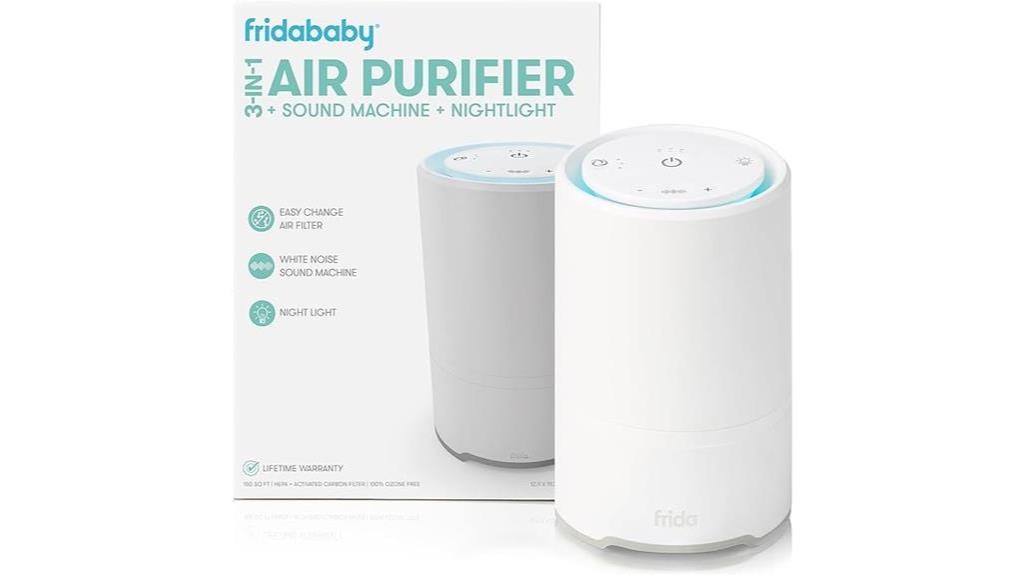
If you're a parent looking for a versatile solution that promotes better sleep and air quality for your baby, the Frida Baby 3-in-1 Baby Sound Machine is a fantastic choice. This product combines a sound machine, nightlight, and air purifier, which really simplifies my nursery setup. With two white noise options and a HEPA filter that effectively removes smoke and odors, I feel confident my baby is breathing cleaner air. The adjustable fan with three speeds is a game-changer, and I love that I can set the auto-off timer. Plus, the nightlight offers four soothing colors, creating a perfect bedtime ambiance. Overall, it's user-friendly, saves space, and has made a noticeable difference in my baby's sleep quality.
Best For: Parents seeking a compact and multifunctional device that enhances their baby's sleep environment and air quality.
Pros:
- 3-in-1 functionality saves space and money by combining a sound machine, nightlight, and air purifier.
- Adjustable fan with three speeds and customizable nightlight colors for a personalized bedtime experience.
- User-friendly design with easy operation and a convenient auto-off timer feature.
Cons:
- Timer settings can be overly sensitive, potentially disrupting intended usage.
- Nightlight brightness may be too high for small rooms, making it uncomfortable for some users.
- Limited sound options and poor audio quality may not meet the expectations of those with existing sound machines.
LEVOIT Air Purifier for Home (Core300-P)
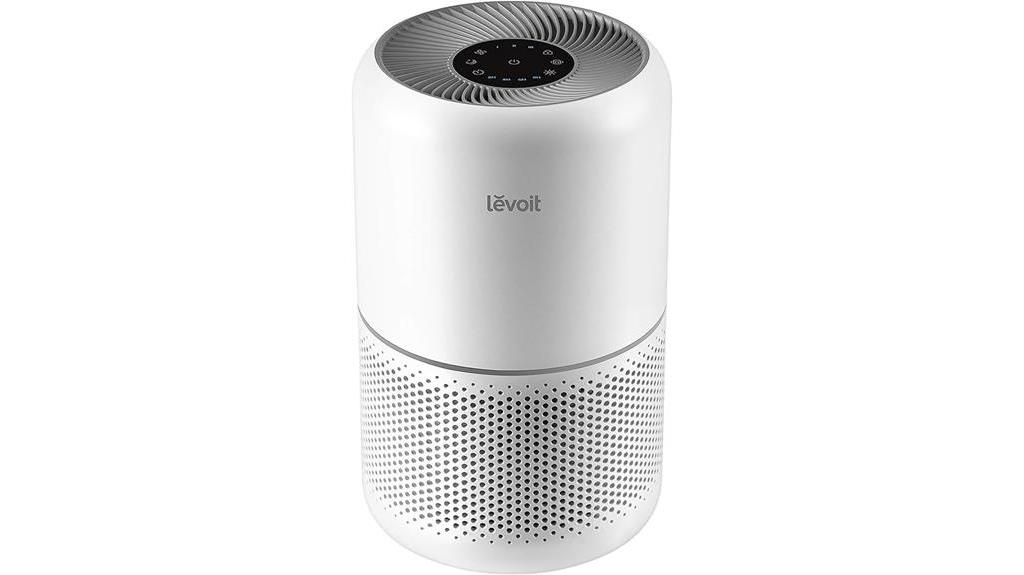
The LEVOIT Core 300-P Air Purifier stands out as an excellent choice for parents concerned about their baby's air quality. With a compact size of 8.7 x 8.7 x 14.2 inches, it fits seamlessly into any room while effectively covering up to 1,095 square feet. The HEPA-grade filter captures 99.97% of airborne particles like pollen and dander, making it a reliable option for allergy sufferers. I appreciate its quiet operation, especially during sleep mode, which reduces noise to just 24 dB. Plus, the touch LCD menu makes adjusting settings a breeze. The stylish design blends well with home decor, ensuring it's not just functional but also visually appealing. Overall, it's a solid investment for cleaner air.
Best For: The LEVOIT Core 300-P Air Purifier is best for parents and allergy sufferers looking to improve indoor air quality in a compact and stylish design.
Pros:
- Quiet operation with a sleep mode that reduces noise to just 24 dB, ideal for nighttime use.
- Highly efficient HEPA-grade filter captures 99.97% of airborne particles, providing relief from allergens.
- Compact and modern design fits well in various home decor, making it a versatile addition to any room.
Cons:
- Filter replacement is recommended every 6 months, which can add to maintenance costs.
- May struggle with larger spaces beyond the recommended coverage of 1,095 square feet.
- Some users may find the touch LCD menu less intuitive compared to traditional dials or buttons.
LEVOIT Air Purifier for Bedroom Home, Core Mini
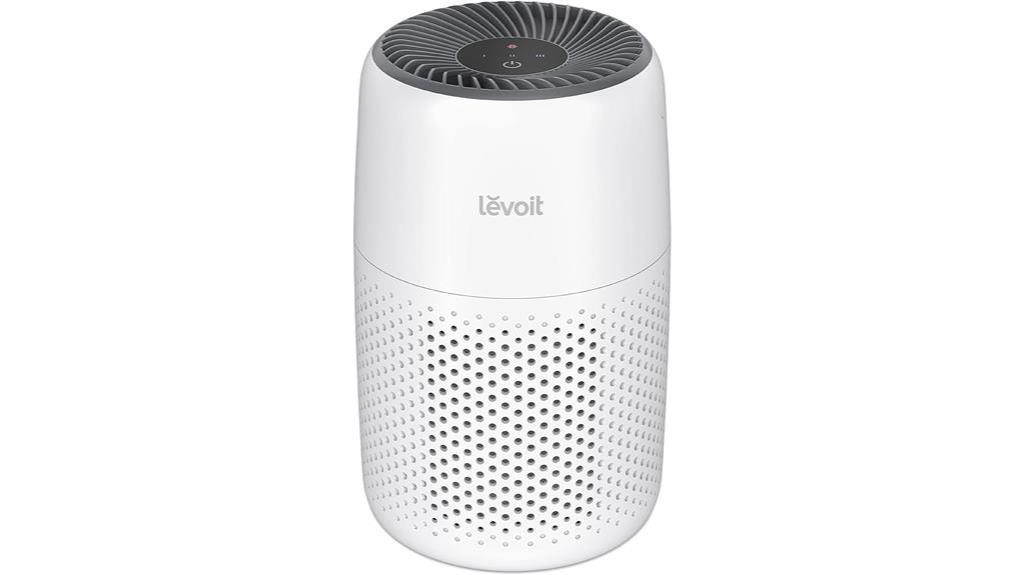
For parents looking to create a healthier sleeping environment for their little ones, the LEVOIT Core Mini Air Purifier stands out with its compact design and whisper-quiet operation. Measuring just 6.5 x 6.5 x 10.4 inches, it fits easily on a nightstand without taking up much space. With a noise level as low as 25 dB, it won't disturb your baby's sleep. The 3-stage filtration system, including a True HEPA filter, effectively removes dust, pollen, and pet dander, ensuring cleaner air. Plus, the aroma pad allows me to add essential oils for a soothing scent. Users rave about its performance, reporting improved sleep quality and reduced allergens, making it a perfect choice for our little ones.
Best For: Parents seeking a compact and quiet air purifier to enhance their child's sleeping environment by reducing allergens and odors.
Pros:
- Effective filtration with a True HEPA filter that targets dust, pollen, and pet dander.
- Whisper-quiet operation as low as 25 dB, ensuring minimal disturbance during sleep.
- Compact design that fits easily on nightstands and desks, saving space.
Cons:
- Filter replacement every 6-8 months, leading to ongoing maintenance costs.
- Lacks smart features such as Wi-Fi connectivity for remote control.
- Limited coverage area of 337 square feet, which may not be suitable for larger spaces.
LEVOIT Air Purifier for Home Bedroom (Core 200S-P)
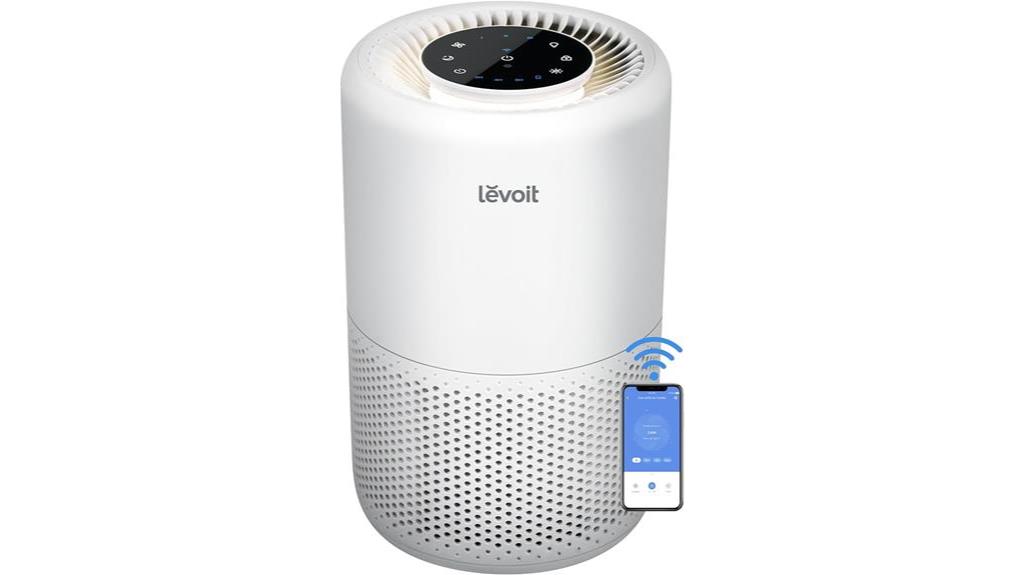
Looking for an air purifier that's perfect for your baby's room? The LEVOIT Core 200S-P might just be what you need. It covers up to 916 sq. ft., making it suitable for larger spaces while maintaining a low noise level of just 24 dB—ideal for a peaceful sleep environment. Its 3-in-1 filtration system effectively removes 99.97% of particles, ensuring your little one breathes clean air. Plus, it cleans the air five times per hour in smaller rooms. I love the convenience of the VeSync app, which lets me control settings remotely and set schedules. Although some users note occasional app disconnections, the overall effectiveness and quiet operation make the Core 200S-P a top choice for baby's health.
Best For: The LEVOIT Core 200S-P Air Purifier is best for families looking to maintain a clean and quiet environment in their baby's room.
Pros:
- Quiet operation at just 24 dB, ensuring a peaceful sleep environment.
- Effective filtration system that removes 99.97% of particles, promoting better air quality for sensitive individuals.
- Smart features including remote control through the VeSync app and compatibility with Amazon Alexa and Google Assistant.
Cons:
- Some users report occasional app disconnections, which can interrupt remote functionality.
- Lack of a dedicated remote control for easy adjustments during the night.
- Filter replacement is necessary, and monitoring can be dependent on app connectivity.
BLUEAIR Mini Air Purifier for Bedroom and Small Rooms
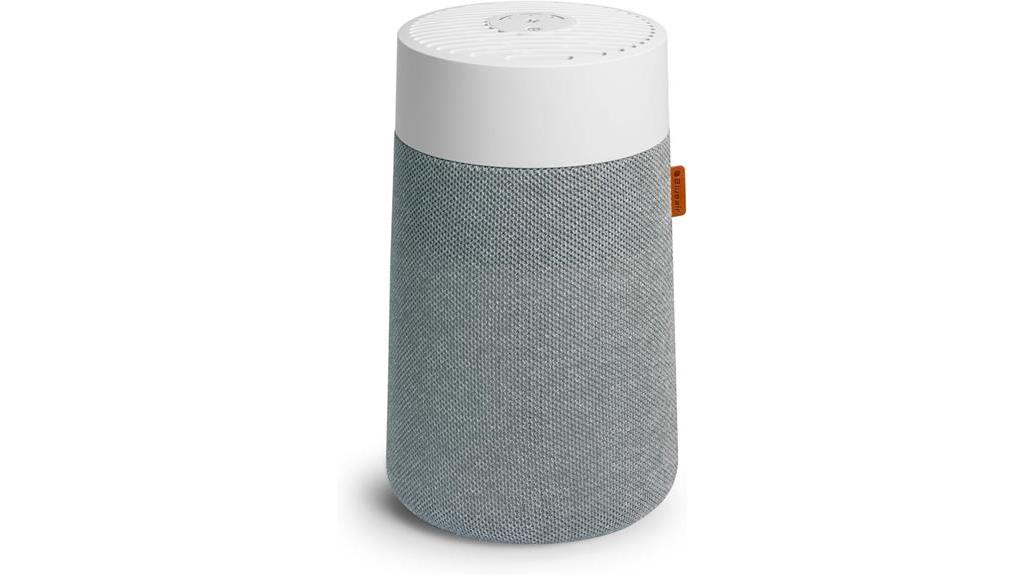
When seeking an air purifier that's perfect for babies, the Blueair Mini Air Purifier stands out with its virtually silent operation at just 25 dB. It's compact and lightweight, making it ideal for bedrooms or nurseries, covering up to 223 square feet in just 30 minutes. I love its HEPASilent technology, which removes 99.97% of airborne particles, including dust and pet dander—essential for keeping the air safe for my little one. With three-speed settings and a simple two-button interface, it's easy to use. Plus, the washable pre-filters come in various colors, adding a stylish touch to any decor. Overall, the Blueair Mini is a reliable choice for clean air and peace of mind in your baby's room.
Best For: The Blueair Mini Air Purifier is best for individuals seeking a compact and efficient air purification solution for bedrooms, nurseries, or small offices, particularly those with allergies.
Pros:
- HEPASilent technology effectively removes 99.97% of airborne particles, ensuring cleaner air.
- Virtually silent operation at 25 dB makes it perfect for sleeping environments.
- Customizable washable pre-filters in various colors enhance the aesthetic appeal.
Cons:
- Some users find the interface difficult to navigate and operate.
- Filter replacement process may be challenging for certain individuals.
- Limited filter options available at purchase may restrict customization.
Factors to Consider When Choosing Air Purifiers for Babies
When you're choosing an air purifier for your baby, there are several important factors to keep in mind. You'll want to evaluate the noise level, filtration efficiency, and safety features, as these can greatly impact your baby's comfort and health. Additionally, think about the size and portability, along with how easy it is to maintain the unit.
Noise Level Considerations
Choosing the right air purifier for your baby involves paying close attention to noise levels, as excessive sound can disrupt their sleep and overall well-being. Ideally, you want an air purifier that operates between 24 dB and 44 dB. Sounds below 30 dB are generally quiet enough for restful sleep, making them a top choice for nursery environments.
Many parents opt for models with a "sleep mode" feature, reducing noise to around 24 dB or less during nighttime hours. This guarantees minimal disruption when your little one is trying to rest. It's vital to select purifiers with noise levels lower than typical white noise machines, which range from 30 dB to 50 dB, to maintain a calming atmosphere.
Additionally, consider air purifiers with adjustable fan speeds. This flexibility allows you to choose quieter settings, further contributing to a peaceful sleeping space. Remember, consistent exposure to loud noises can negatively impact your baby's sleep quality and overall health. Prioritizing noise level is key in creating the serene environment your baby needs for healthy rest and development.
Filtration Efficiency Requirements
Filtration efficiency is an important factor to take into account for any air purifier intended for babies. You want a purifier that features a True HEPA filter, as it removes at least 99.97% of airborne particles as small as 0.3 microns. This includes allergens like dust, pollen, and pet dander, which can trigger respiratory issues in infants. Effective filtration is essential for reducing allergy symptoms and improving overall air quality in your baby's environment.
Look for units with a high Clean Air Delivery Rate (CADR); a higher CADR means faster and more efficient air cleaning, critical for a healthy space. Regular filter replacement is also necessary to maintain filtration efficiency, so check that the HEPA filter can be replaced every 6 months to a year, depending on usage and air quality.
Additionally, consider air purifiers with multiple filtration stages. Models featuring pre-filters and activated carbon filters can capture larger particles and odors before they reach the HEPA filter, enhancing overall performance. By prioritizing these filtration efficiency requirements, you can guarantee a cleaner and safer air environment for your little one.
Size and Portability
How can you guarantee your air purifier fits seamlessly into your baby's space? Start by choosing a compact model that won't overwhelm small areas like nightstands or cribs. Look for lightweight options, which make it easy to move the purifier from room to room as needed.
Make certain the air purifier has a coverage area suitable for your baby's nursery; models that can effectively purify air in spaces up to 300 square feet are ideal. This guarantees you're getting the best air quality without any unnecessary bulk.
Additionally, pay attention to the design. Opt for a sleek, modern look that complements your room's decor while keeping a low profile to avoid clutter. Finally, consider the noise level. Quieter models, around 25 dB, are preferable, so they won't disturb your baby's sleep.
Safety Features Importance
When it comes to guaranteeing your baby's safety, air purifiers equipped with essential safety features play an important role. These devices help eliminate harmful pollutants like dust, pollen, and pet dander that can negatively affect your baby's developing respiratory system. Look for air purifiers with high-efficiency filters, such as True HEPA, which can remove at least 99.97% of airborne particles down to 0.3 microns. This guarantees the air your little one breathes is free from allergens and irritants.
Child lock features are another vital safety aspect, preventing curious little hands from making accidental adjustments. You'll also want to take into account the noise level of the purifier; models operating as quietly as 24 dB are perfect for sleep environments, allowing your baby to rest undisturbed. Additionally, some air purifiers come with automatic shut-off timers, enhancing safety by preventing continuous operation when it's not needed. This reduces energy consumption and minimizes overheating risks. By focusing on these safety features, you can create a cleaner, healthier environment for your baby to thrive in.
Ease of Maintenance
Choosing the right air purifier for your baby's room doesn't just hinge on its filtration capabilities; maintenance plays a crucial role too. You'll want to look for models with easy filter replacement systems, ideally those that let filters last several months. This minimizes your maintenance effort and keeps the air clean for longer periods.
Additionally, consider air purifiers that feature filter change indicators. These handy alerts will notify you when it's time to swap out the filter, ensuring peak performance without any guesswork. Washable pre-filters are another great option, as they can prolong the life of the main filter, reducing the frequency of replacements and saving you money.
Access to filters is also essential. Opt for units designed for easy access so you can quickly perform maintenance without needing specialized tools. Finally, evaluate noise levels during operation, particularly in sleep mode. Quieter models can help maintain a peaceful environment for your little one while still being easy to care for. By prioritizing these maintenance features, you'll create a safe and clean atmosphere for your baby with minimal hassle.
Air Quality Indicators
Understanding air quality indicators is essential for ensuring a safe environment for your baby. When choosing an air purifier, look for one that effectively removes at least 99.97% of particles as small as 0.3 microns, including dust, pollen, and pet dander. This capability is vital for maintaining clean air.
Check the Clean Air Delivery Rate (CADR) ratings, which indicate how quickly and efficiently the purifier cleans the air in a specific area. Higher CADR ratings mean better performance, measured in cubic feet per minute.
Keep an eye on volatile organic compounds (VOCs), as these harmful gases can emanate from household products and negatively impact indoor air quality. A good air purifier should address this concern effectively.
Noise levels are another important factor, especially for babies. Opt for air purifiers that operate at low noise levels, ideally around 24 dB, to create a peaceful sleeping environment.
Design and Aesthetics
Selecting an air purifier for your baby's room goes beyond just functionality; design and aesthetics play an essential role too. You want a compact, modern design that blends seamlessly into the nursery or bedroom decor, minimizing clutter while maintaining effectiveness. Look for models that enhance aesthetics with customizable elements, like washable pre-filters in various colors, so you can match the purifier to the room's theme.
Consider the size and weight of the air purifier as well. Lighter models can be easily moved between rooms, adapting to your needs. Don't forget about safety features—child locks and auto-dimming displays are vital for preventing accidental adjustments and ensuring your little one enjoys undisturbed sleep.
Quiet operation is another important factor. Opt for models that operate at low noise levels (around 25 dB) to maintain a peaceful environment for your baby. By prioritizing design and aesthetics along with functionality, you can create a safe, stylish, and serene space for your little one, all while ensuring they breathe clean air. Choosing the right air purifier can enhance both their comfort and the overall look of the room.
Frequently Asked Questions
How Often Should I Replace the Air Purifier Filter?
You should replace your air purifier filter based on the manufacturer's recommendations, usually every 6 to 12 months. However, if you notice reduced airflow or increased dust accumulation, it's a sign that your filter needs changing sooner. Regularly checking the filter's condition can help maintain peak performance. Keep an eye on usage patterns too; if you run it continuously, you might need to replace the filter more often.
Are Air Purifiers Noisy, Especially at Night?
Air purifiers can be a gentle hum or a disruptive roar, depending on the model. While some units operate quietly, allowing you to enjoy peaceful nights, others might emit noticeable sounds that could disturb your sleep. You'll want to check the decibel levels of the purifier you're considering. Many modern purifiers have a "sleep mode," which minimizes noise, ensuring you breathe clean air without sacrificing tranquility during those nighttime hours.
Can Air Purifiers Help With Allergies in Babies?
Air purifiers can definitely help with allergies in babies. They filter out allergens like dust, pet dander, and pollen, creating a cleaner environment. When you run an air purifier, it can reduce your baby's exposure to these irritants, potentially easing allergy symptoms. Just make sure to choose a model that's quiet and has a true HEPA filter for the best results. Your little one will breathe easier, leading to better sleep and comfort.
What Size Air Purifier Is Best for a Nursery?
Choosing the right air purifier for a nursery is like picking the perfect blanket for a cozy night's sleep. You'll want one that matches the room size—typically, a purifier rated for 200 to 400 square feet works well. This guarantees it can effectively clean the air without overwhelming the space. Keep an eye on the Clean Air Delivery Rate (CADR) too; higher numbers mean better filtration. Your little one deserves the freshest air possible!
Do Air Purifiers Remove Odors, Like Diaper Smells?
Yes, air purifiers can effectively remove odors, including diaper smells. They use HEPA filters and activated carbon to trap and neutralize particles and odors in the air. When you run an air purifier consistently, it helps improve the overall air quality by eliminating unpleasant smells and allergens. Just make sure to choose one with a good odor-removing capability to tackle those stubborn diaper odors effectively and keep your space smelling fresh.
Wrapping Up
In the quest for pure air, choosing the right air purifier for your baby is like finding a cozy blanket on a chilly night. With options like LEVOIT and BLUEAIR, you can create a sanctuary of fresh air that wraps your little one in safety. Remember, the right purifier not only filters out pollutants but also nurtures your baby's health. So, breathe easy knowing you're giving your child the clean, safe environment they deserve.

Hi, I’m Charlie, and I cover all things laundry here at Appliance Mastery.
I’ve spent over eight years working on washing machines, dryers, and dishwashers. I also have a degree in mechanical engineering, which helps me understand how these appliances really work.
I try to make every guide clear and practical. If you’re stuck with a noisy dryer or a leaking washer, I’ll help you figure out what’s wrong and how to fix it.
